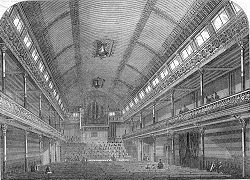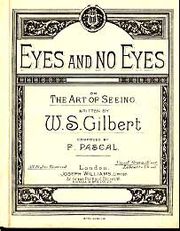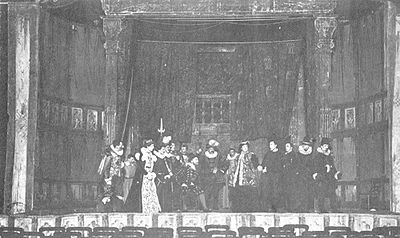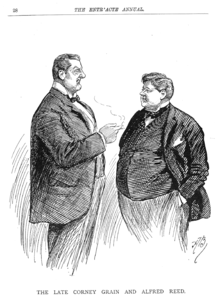.gif)
St. George's Hall (London)
Encyclopedia

Regent Street
Regent Street is one of the major shopping streets in London's West End, well known to tourists and Londoners alike, and famous for its Christmas illuminations...
in London, built in 1867, which closed in 1966. The hall could accommodate between 800 and 900 persons, or up to 1,500 persons including the galleries. The architect was John Taylor of Whitehall.
The hall was known for three decades for its presentation of the German Reed Entertainments alongside other musical works and lectures. After 1895, it was used for vaudeville
Vaudeville
Vaudeville was a theatrical genre of variety entertainment in the United States and Canada from the early 1880s until the early 1930s. Each performance was made up of a series of separate, unrelated acts grouped together on a common bill...
, drama, magic shows, as the headquarters of the London Academy of Music
London Academy of Music and Dramatic Art
The London Academy of Music and Dramatic Art is a leading British drama school in west London. LAMDA's president is Timothy West and its new principal is Joanna Read, who recently succeeded Peter James...
, and even as a skating rink. In 1933, it became a BBC broadcasting studio but was shut down after extensive damage from bombing in March 1943. The theatre was demolished in 1966, and the St Georges Hotel and Henry Wood House now stand on the site.
German Reed Entertainments and lectures
The hall was built as a concert hall for the New Philharmonic Society and opened on 24 April 1867. The Hall could be used as a theatre, however, and the first production at "St. George's Theatre" was A Woman's Whim by Walter Stephens on 3 December 1867.
Thomas German Reed
Thomas German Reed was an English composer and theatrical manager best known for creating the German Reed Entertainments, a genre of musical plays that made theatre-going respectable at a time when the stage was considered disreputable...
, who initially produced and conducted The Contrabandista
The Contrabandista
The Contrabandista, or The Law of the Ladrones, is a two-act comic opera by Arthur Sullivan and F. C. Burnand. It premiered at St. George's Hall, in London, on 18 December 1867 under the management of Thomas German Reed, for a run of 72 performances. There were brief revivals in Manchester in 1874...
(a comic opera
Comic opera
Comic opera denotes a sung dramatic work of a light or comic nature, usually with a happy ending.Forms of comic opera first developed in late 17th-century Italy. By the 1730s, a new operatic genre, opera buffa, emerged as an alternative to opera seria...
by Arthur Sullivan
Arthur Sullivan
Sir Arthur Seymour Sullivan MVO was an English composer of Irish and Italian ancestry. He is best known for his series of 14 operatic collaborations with the dramatist W. S. Gilbert, including such enduring works as H.M.S. Pinafore, The Pirates of Penzance and The Mikado...
and F. C. Burnand), The Beggar's Opera
The Beggar's Opera
The Beggar's Opera is a ballad opera in three acts written in 1728 by John Gay with music arranged by Johann Christoph Pepusch. It is one of the watershed plays in Augustan drama and is the only example of the once thriving genre of satirical ballad opera to remain popular today...
and other English operas in small-scale productions. In 1874, Reed's wife, Priscilla German Reed
Priscilla Horton
Priscilla Horton, later Priscilla German Reed , was a popular English singer and actress, known for her role as Ariel in W. C. Macready's production of The Tempest in 1838 and "fairy" burlesques at Covent Garden Theatre. Later, she was known, along with her husband, Thomas German Reed, for...
, moved the German Reed Entertainment
German Reed Entertainment
German Reed Entertainment was founded in 1855 and operated by Thomas German Reed together with his wife, Priscilla Reed née Horton...
s to St. George's Hall. Like their earlier theatre, the Gallery of Illustration, St. George's had a small stage, and musical works were presented with only piano and harmonium. Thomas retired in 1871, and his son Alfred continued to run the theatre with his mother until her retirement in 1879 and, beginning in 1977, in partnership with Richard Corney Grain
Richard Corney Grain
Richard Corney Grain , known by his stage name Corney Grain, was an entertainer and songwriter of the late Victorian era.-Biography:...
, until both their deaths in 1895.
The pieces premiered there included W. S. Gilbert
W. S. Gilbert
Sir William Schwenck Gilbert was an English dramatist, librettist, poet and illustrator best known for his fourteen comic operas produced in collaboration with the composer Sir Arthur Sullivan, of which the most famous include H.M.S...
's farce, A Medical Man (1872) and his one-act comic opera
Comic opera
Comic opera denotes a sung dramatic work of a light or comic nature, usually with a happy ending.Forms of comic opera first developed in late 17th-century Italy. By the 1730s, a new operatic genre, opera buffa, emerged as an alternative to opera seria...
, Eyes and No Eyes
Eyes and No Eyes
Eyes and No Eyes, or The Art of Seeing is a one-act musical entertainment with a libretto by W. S. Gilbert and music originally by Thomas German Reed that premiered on July 5, 1875 at St. George's Hall in London and ran for only a month. The original music was lost, and twenty years later new...
(1875). John Baldwin Buckstone
John Baldwin Buckstone
John Baldwin Buckstone was an English actor, playwright and comedian who wrote 150 plays, the first of which was produced in 1826....
wrote Married Life, and John Maddison Morton
John Maddison Morton
John Maddison Morton was an English playwright who specialized in one-act farces. His most famous farce was Box and Cox . He also wrote comic dramas, pantomimes and other theatrical pieces.-Biography:...
wrote Slasher and Crasher for the hall, both in 1872. In addition to performances, there were regular lectures in the hall, the Chartist
Chartist
Chartist may refer to:*Chartist , a person who uses charts for technical analysis*Chartist , a British social democratic periodical*An adherent of Chartism, a 19th-century political and social reform movement in the UK...
Gerald Massey
Gerald Massey
Gerald Massey was an English poet and self-educated Egyptologist. He was born near Tring, Hertfordshire in England.-Biography:...
gave a series of lectures in 1872, on Christianity and Spiritualism. The theist Charles Voysey
Charles Voysey (theist)
Charles Voysey was an English Anglican priest who was condemned by the Privy Council for heresy and went on to found the Theist Church....
gave regular Sunday sermons from 1875, after his ejection from the established church. H. G. Wells
H. G. Wells
Herbert George Wells was an English author, now best known for his work in the science fiction genre. He was also a prolific writer in many other genres, including contemporary novels, history, politics and social commentary, even writing text books and rules for war games...
described a visit to one tedious Sunday lecture in Incidental Thoughts on a Bald Head . When they were not presenting a piece at the hall, it was rented it out to amateurs or other entertainments.


Gilbert Arthur a Beckett
Gilbert Arthur à Beckett was an English writer.-Biography:Beckett was born at Hammersmith, United Kingdom, the eldest son of Gilbert Abbott à Beckett and the brother of Arthur William à Beckett...
presented Two Foster Brothers, composed by Alfred Cellier
Alfred Cellier
Alfred Cellier was an English composer, orchestrator and conductor.In addition to conducting and music directing the original productions of several of the most famous Gilbert and Sullivan works and writing the overtures to some of them, Cellier conducted at many theatres in London, New York and...
(1877), and Once in a Century, with music by Vivian Bligh. Henry Pottinger Stephens
Henry Pottinger Stephens
Henry Pottinger Stephens, also known as Henry Beauchamp , was an English dramatist and journalist. With a variety of partners, he wrote burlesques, comic operas and musical comedies that briefly rivalled the Savoy Operas in popular esteem.-Life and career:"Pot" Stephens was born in Barrow-on-Soar,...
wrote his first burlesque, Back from India for the hall in 1879, as well as Hobbies in 1885, with William Yardley
William Yardley (cricketer)
William Yardley was an English cricketer who played first-class cricket for Kent from 1868 to 1878 and for Cambridge University from 1869 to 1872. In the early 1870s, only WG Grace was reckoned his superior amongst amateur batsmen...
and music by George Gear. Cherry Tree Farm and All at Sea played in 1881. The same year, William Poel
William Poel
William Poel was an English actor, theatrical manager and dramatist best known for his presentations of Shakespeare.-Life and career:...
produced his Hamlet
Hamlet
The Tragical History of Hamlet, Prince of Denmark, or more simply Hamlet, is a tragedy by William Shakespeare, believed to have been written between 1599 and 1601...
. In the early 1880s, Eric Lewis
Eric Lewis (actor)
Frederic Lewis Tuffley , better known by his stage name, Eric Lewis, was an English comedian, actor and singer...
sometimes substituted at the Hall for Corney Grain. Herbert Gardiner wrote A Night in Wales (1885) for the hall with music by Corney Grain. Alfred J. Caldicott wrote a number of pieces for the hall, including A Treasure Trove, A Moss Rose Rent (1883), Old Knockles (1884), In Cupid's Court (1885), The Friar (1886), Tally Ho (1887), Wanted, An Heir and The Boson's Mate (1888), John Smith (1889), The Old Bureau (1891), and An Old Pair (1893).
Fanny Holland
Fanny Holland
Fanny Holland was an English singer and comic actress primarily known as the creator of principal soprano roles in numerous German Reed Entertainments.-Life and career:...
starred in many of the entertainments, along with Mr. and Mrs. German Reed, their son Alfred, Holland's husband Arthur Law
Arthur Law
William Arthur Law , better known as Arthur Law, was an English playwright, actor and scenic designer.-Life and career:...
, Corney Grain, Arthur Cecil
Arthur Cecil
Arthur Cecil Blunt, better known as Arthur Cecil was an English actor, comedian, playwright and theatre manager. He is probably best remembered for playing the role of Box in the long-running production of Cox and Box, by Arthur Sullivan and F. C...
(all of whom also wrote for the hall) Carlotta Carrington and Leonora Braham
Leonora Braham
Leonora Braham , born Leonora Lucy Abraham, was an English opera singer and actress primarily known as the creator of principal soprano roles in the Gilbert and Sullivan comic operas....
, who made her professional stage debut in 1870 at the hall in a revival of Gilbert
W. S. Gilbert
Sir William Schwenck Gilbert was an English dramatist, librettist, poet and illustrator best known for his fourteen comic operas produced in collaboration with the composer Sir Arthur Sullivan, of which the most famous include H.M.S...
and Clay
Frederic Clay
Frederic Emes Clay was an English composer known principally for his music written for the stage. Clay, a great friend of Arthur Sullivan's, wrote four comic operas with W. S...
's Ages Ago
Ages Ago
Ages Ago is a musical entertainment with a libretto by W. S. Gilbert and music by Frederic Clay that premiered on 22 November 1869 at the Royal Gallery of Illustration. It marked the beginning of a seven year long collaboration between the two. The piece was revived many times, including at St...
, which was revived again there in 1874. Except for a brief stint at the Criterion Theatre
Criterion Theatre
The Criterion Theatre is a West End theatre situated on Piccadilly Circus in the City of Westminster, and is a Grade II* listed building. It has an official capacity of 588.-Building the theatre:...
in 1874 and at the Savoy Theatre
Savoy Theatre
The Savoy Theatre is a West End theatre located in the Strand in the City of Westminster, London, England. The theatre opened on 10 October 1881 and was built by Richard D'Oyly Carte on the site of the old Savoy Palace as a showcase for the popular series of comic operas of Gilbert and Sullivan,...
in 1879-80, Holland starred at St. George's until 1895 in entertainments too numerous to name. Many of the entertainments were written by Law, including A Night Surprise (1877), Nobody's Fault, composed by Hamilton Clarke (1882), and A Happy Bungalow, with music by Charles King Hall
Charles King Hall
Charles King Hall , often credited as King Hall, was a versatile English composer of both sacred and secular music. He favored the sentimental ballad and the church anthem. He specialized in arranging for piano and voice the works of famous composers such as Gounod and Mendelssohn. In addition,...
. Other pieces from the 1870s starring Holland included Number 204 by F. C. Burnand, with music by Thomas German Reed; and Our New Doll’s House by W. Wye, with music by Cotsford Dick.
Later uses of the hall
After the German Reed Entertainments closed in 1895, the building changed its name to the Matinee Theatre, on 17 April 1897, presenting "high class vaudevilleVaudeville
Vaudeville was a theatrical genre of variety entertainment in the United States and Canada from the early 1880s until the early 1930s. Each performance was made up of a series of separate, unrelated acts grouped together on a common bill...
," but it was not very successful. A series of German plays were then produced, but in 1904 the hall closed.
In 1905, magician John Nevil Maskelyne
John Nevil Maskelyne
John Nevil Maskelyne was an English stage magician and inventor of the pay toilet, along with many other Victorian-era devices. His door lock for London toilets required the insertion of a penny coin to operate it, hence the euphemism to "spend a penny".-Biography:Maskelyne was born in Cheltenham,...
renovated, expanded and reopened the 'St George's Hall, England's New Home of Mystery,' on 24 January 1905 with The Coming Race by David Christie Murray and Maskelyne. Maskelyne's entertainments were called Maskelyne's Theatre of Mystery. The theatre also hosted meetings of The Magic Circle
The Magic Circle
The Magic Circle is a British organisation, founded in London in 1905, dedicated to promoting and advancing the art of magic.- History :The Magic Circle was founded in 1905 after a meeting of 23 amateur and professional magicians at London's Pinoli's Restaurant...
, an association of amateur and professional magicians, and its members David Devant
David Devant
David Devant was an English magician, shadowgraphist and film exhibitor. He was born David Wighton in Holloway, London...
and Maskelyne continued to give magic shows for many years. One was called Maskelyne and Devant's Mysteries, which was presented in August 1910.
The hall was also used as a Bioscope Picture Palace, although with a reduced capacity of 500. The building also was used as the headquarters of the London Academy of Music
London Academy of Music and Dramatic Art
The London Academy of Music and Dramatic Art is a leading British drama school in west London. LAMDA's president is Timothy West and its new principal is Joanna Read, who recently succeeded Peter James...
. The hall was later converted to use as a skating rink.
St. George's was finally acquired by Eric Maschwitz
Eric Maschwitz
Albert Eric Maschwitz OBE , known as Eric Maschwitz and sometimes credited as Holt Marvell, was an English entertainer, writer, broadcaster and broadcasting executive.-Life and work:...
for the BBC in 1933 for broadcasts of vaudeville, comedy and revue shows, and opened as a studio on November 25th, 1933. The BBC installed the original BBC Theatre Organ in 1936, a Compton Melotone and Electrostatic Organ, this enabled a wide range of sounds to be produced during performances. Reginald Foort was appointed resident organist. The hall sustained extensive damage from bombing in March 1943, during World War II
World War II
World War II, or the Second World War , was a global conflict lasting from 1939 to 1945, involving most of the world's nations—including all of the great powers—eventually forming two opposing military alliances: the Allies and the Axis...
, and the studios moved to the Aeolian Hall
Aeolian Hall (London)
Aeolian Hall located at 135-137 New Bond Street, began life as the Grosvenor Gallery, being built by Sir Coutts Lindsay in 1876, an accomplished amateur artist, with a predeliction for the aesthetic movement, for which he was held up to some ridicule. In 1883, he decided to light his gallery with...
, in New Bond Street.
The building was demolished in 1966, and together with the site of the adjacent Queens Hall – original home of the Henry Wood
Henry Wood (conductor)
Sir Henry Joseph Wood, CH was an English conductor best known for his association with London's annual series of promenade concerts, known as the Proms. He conducted them for nearly half a century, introducing hundreds of new works to British audiences...
promenade concert
The Proms
The Proms, more formally known as The BBC Proms, or The Henry Wood Promenade Concerts presented by the BBC, is an eight-week summer season of daily orchestral classical music concerts and other events held annually, predominantly in the Royal Albert Hall in London...
s – the location was used for the construction of the St Georges Hotel and Henry Wood House.

